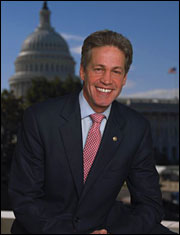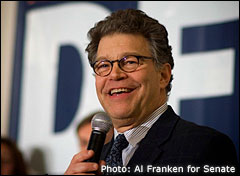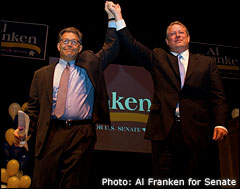Back in April, Democrat Al Franken’s chances of pulling out a win in the Minnesota Senate race looked dismal. Incumbent Republican Norm Coleman had a big lead the polls, and Franken was dogged by controversies over income-tax errors and off-color sketches from his comedic past.
The underdog spent the summer traveling the state, promoting, among other things, his plans for green jobs and renewable energy, two issues he’s put at the center of his campaign. Franken also spent the summer engaged in a brutal negative ad war with Coleman, prompting many political observers to call their race the nastiest of the election season (and that’s saying something).
The tables have turned in recent weeks. While Franken has taken a lead in the polls, Coleman has pledged to halt his negative ads and been forced to respond to charges that a big donor bought him pricey suits and a GOP strategist set him up with a sweet low-rent pad in D.C.

Coleman has earned a 27 percent lifetime score from the League of Conservation Voters, and a slightly higher mark of 33 in the first half of the 110th Congress. He has earned some respect from enviros over the years for (at least tepidly) opposing drilling in the Arctic National Wildlife Refuge and, more recently, voicing support for the Lieberman-Warner Climate Security Act (though he wasn’t present when the Senate voted on it and came up short). On his campaign site, Coleman touts his plan to upgrade the country’s energy infrastructure, but the words “climate change” or “global warming” don’t appear anywhere.
Franken was a Saturday Night Live writer and actor starting in the show’s glory days in the 1970s, then went on to host a nationally syndicated radio show on Air America and write humorous political bestsellers like Lies and the Lying Liars Who Tell Them. His record of poking fun at politics (sometimes through crass jokes and curse words) caused some to wonder about the sincerity of his run for the Senate, and at first the candidate seemed hesitant to show his funny side on the campaign trail. But a more recent ad from Franken featured a talking fish tying Coleman to the crooked oilman at the heart of Sen. Ted Stevens’ indictment.
Franken lists among his top issues both gas prices and renewable energy, and calls for the country to “fundamentally change our energy policy and end our reliance on foreign oil.” He also got some support from Al Gore at a recent campaign event, which might give him a boost on the enviro front.
While Franken’s chances appear increasingly brighter, the Independence Party candidate in the state, Dean Barkley, is still polling an impressive 17 percent, and the race is likely to be tight up until Nov. 4. Attempts to reach Coleman for an interview were not successful, but Grist caught up with Franken for an email interview about gas prices, the Bush administration’s environmental failures, and whether the environment can be funny.
—–
Grist: What made you decide to jump in the race this year? You seemed to be having a perfectly good time observing electoral politics from the outside.
Franken: I’ve spent a lot of my career watching the political process, and lately I’ve been really concerned with the direction we’re heading. Minnesota’s middle-class families haven’t been getting a fair shake in Washington with George W. Bush in the White House, Norm Coleman in the Senate, and special interests running the show. We need to change Washington to get our country back on track and make our economy work for everyone.
Grist: One of the key issues on your website is gas prices. What’s the best way to lower them in the short term, and how do we do that while at the same time lowering dependence on oil?
Franken: Lowering gas prices and reducing our dependence on foreign oil are one and the same. When we lower our dependence on oil, we reduce demand and the price goes down. For short-term gas-price solutions, I want to crack down on speculation in the oil futures market. And I want to release 50 million barrels from the Strategic Petroleum Reserve to immediately lower the price of gas. Republicans are calling for more Big Oil giveaways in the form of more offshore leases, but this won’t do anything to bring down costs. Our real challenge is to transform our energy economy immediately.
We need leadership in Washington to invest in wind and solar energy, tidal, geothermal, biomass, and the next generation of biofuels: cellulosic ethanol. By transitioning to alternative energy sources, we decrease our demand and our dependence on oil. We revitalize our manufacturing sector and create high-paying, skilled jobs. A renewable energy economy should be an economic bonanza for rural Minnesota. This is the challenge of our time — and it’s also an incredible opportunity.
Grist: Some Republicans argue that regulating greenhouse-gas emissions and shifting away from fossil fuels will be catastrophic for the economy and working families. What’s the message you’re taking to voters on this? How do you talk about these issues when people are upset about rising gas prices?
Franken: Revamping our energy policy is win-win-win. And we already have the technology. Let’s talk about energy efficiency for a minute — I want to use this technology to revitalize our economy. I want to start retrofitting homes that have been foreclosed on to raise the property values across the neighborhood and reduce carbon emissions at the same time. I want to start making plug-in electric hybrid cars here in America. And building our mass transit system — I’m talking rail, light-rail, inner-city rail. This is a massive opportunity for employment and economic growth. Voters understand more than the Republican talking points give them credit for. They know that stopping these budget-breaking tax giveaways to oil companies means we can invest in jobs and infrastructure here at home.
Grist: You also classify renewable energy as one of your top issues, rather than “energy independence,” which is the buzzword in Washington. How should legislators be talking about this, and what should be the priority steps in moving that direction?
Franken: Renewable energy and energy independence are actually inextricably linked. I believe that by focusing on renewable energy — made here in the U.S. — we’re also focusing on energy independence.
Congress has only just begun to develop energy policies that will move us in the right direction toward energy independence and toward addressing global warming. The 111th Congress will need to accelerate the progress on clean energy policies, by adopting legislation to cap and mandate reductions in greenhouse-gas emissions. An average reduction of 2 percent each year would achieve the goal of an 80 percent total reduction by 2050. To reach an 80 percent reduction by 2050, permits to emit carbon should be auctioned — not given away. Auctioning off permits is the most effective way to cut emissions, drive investors to clean energy options, and push the market to demand least-cost alternatives such as efficiency. I actually kind of like the Danish model which allows the permitting fees to be reinvested in those same companies to make the necessary improvements.
Grist: If you get to craft the Franken Climate Act of 2009, what will it look like?
Franken: When I was a kid, I watched John F. Kennedy promise that by the end of the decade we’d put a man on the moon and bring him back safely. Everyone thought he was nuts. But he put our greatest minds and the full backing of the government behind the project, and we did it. Well, it’s time for America to do it again. I propose a new “Apollo Program” — this time to fundamentally change our energy policy and end our reliance on foreign oil. The Apollo Program will be crafted as an economic stimulus — to create high-tech, high-paying jobs in conservation and R&D. And it will be crafted to address the crisis in our manufacturing sector. Plants in Minnesota should be making wind turbines, and we should be putting them up all over America.
I’ll also focus on developing the natural resources we have right here in Minnesota. Minnesotans are proud of our family farmers and their farming tradition. We know Minnesota grows corn and soybeans well. Resources such as biomass and wind are waiting to be tapped to their full potential. But more importantly, we have innovation and creativity and brainpower. If we commit to this undertaking, through investment, education, and training, we will see amazing breakthroughs.
Grist: How important will environmental concerns be for Minnesota voters this year?
Franken: I talk to Minnesota voters every day, and I can tell you it’s a major concern. Voters here get it — the environment is fundamentally tied to the economy, security, and community. And the message really hits home — we’re a state rich in opportunity for wind farms and biofuels. Minnesota has the highest renewable energy standards in the country because last year the state legislature passed a bill requiring the state to provide 25 percent of its electricity from renewable sources by the year 2025.
As the “Land of 10,000 Lakes,” we love our outdoors and our water and want to keep it clean. It’s not only important for the environment, but for our economy, as our beautiful lakes and forests attract over 2 million tourists each year for fishing, hunting, swimming, or sailing in the summertime, or for skating and skiing in the winter. It’s impossible to be anywhere in Minnesota and not recognize that the natural resources we have are a privilege, and we therefore have an obligation to use and protect them wisely.
The Bush administration played fast and loose with the Clean Water Act, endangering countless waterways in the process. But in cleaning up George W. Bush’s mess, we need to be sure not to overreach and place an undue burden on Minnesota farmers.
I believe Minnesotans have the responsibility and desire to meet statewide and national challenges and concerns. We are leaders in the fight against global warming, and it comes from a spirit we call “Minnesota Nice.” It’s a term that describes a culture of caring — we look out for one another as fellow human beings. Part of this spirit involves an active investment in the environment, not only for our state, but also for the greater good of the nation and the world. We simply can’t afford to ignore it.
Grist: In your book Lies and the Lying Liars Who Tell Them, you have a section on the Bush administration and the environment. What do you think needs to be done on environmental issues in the wake of Bush’s tenure?
Franken: First, we need to acknowledge that just any old change won’t do — it’s time to be bold. America is still looked to globally for its leadership, and we have a great opportunity to step up and make a real difference after an eight-year hiatus.
We can start by ratifying the Kyoto Protocol. One of the dumbest things that President Bush said — and that’s a high bar — is that Kyoto would cripple the U.S. economy. I think the opposite is true. A commitment to reducing emissions will spur the manufacturing sector to produce the necessary technologies. A recent study finds that creating the renewable energy capacity to achieve such an emission reduction would create over 18,000 jobs in Minnesota alone. We need a new global agreement on emissions and climate change and we need to engage the entire world. The only way that countries like China and India are going to come to the table on an agreement is if the United States does it first. We must return to the days when we were a shining example for the rest of the world.
Grist: What first got you interested in environmental issues?
Franken: I think it was the first Earth Day, in 1970. I remember this guy in college very clearly — he lived in my dorm, and he was just one of those really good guys. He told me about this Earth Day thing. It hadn’t been long after the Cuyahoga River had caught on fire, so it had a particular resonance. So I went, and that was what got me interested initially. Then I started reading things like The Greening of America and I just realized this is critically important.
Grist: What has been your most memorable outdoor or wilderness adventure?
Franken: My most memorable outdoor experiences have definitely been in the Boundary Waters [Canoe Area Wilderness], specifically in the Quetico [Provincial Park] on the Canadian side. I would go up there once a year or so with my friends when I was in my 20’s. One year we decided to go in October. And while normally we didn’t see anyone for days, this time we just didn’t see anyone, ever. Perfect trip — lots of walleye, lots of eagles, no mosquitoes, and a roaring fire at night kept us warm while we watched the stars. Don’t go swimming, though — not in October in the Quetico. That’s my advice.
Grist: Who is your environmental hero?
Franken: My immediate reaction is to say Al Gore. But my environmental hero is the man or woman who’s dedicated their life in any way to the environmental sciences, environmental justice, or environmental policy. These people are unheralded, but they’re doing work day in and day out that needs to be done to protect our legacy for future generations. And I think Al Gore would agree.
Grist: What have you done personally to reduce your energy and environmental footprint?
Franken: I do everything in my power to be aware of my own impact on the environment, including overseeing my campaign and our offices. I make sure that the campaign does everything that it can to reduce our own footprint. We recycle everything in the office and many of our staff members commute through mass transit every day. The campaign made a commitment early on to keeping the smallest carbon footprint possible. That is why we drive a hybrid vehicle to all of our campaign events. We have events were we compost and try to purchase biodegradable utensils and plates for that purpose. I used to ride my bike to the office, but I just don’t have time to anymore.
Grist: Grist’s shtick is “environmental news with a sense of humor.” And you’re a guy who’s known for his sense of humor. Environmentalists get a bad rap for being downers. Can the environment be funny? Are there ways to broach these concerns that don’t make people want to tune out?
Franken: You know what’s hilarious? Tidal dams.
—–
Other 2008 Grist Candidate Interviews
- Alaska Senate candidate Mark Begich (D)
- Colorado Senate candidate Mark Udall (D)
- Kansas Senate candidate Jim Slattery (D)
- Maine Senate candidate Tom Allen (D)
- Nebraska Senate candidate Scott Kleeb (D)
- New Hampshire Senate candidate Jeanne Shaheen (D)
- Oklahoma Senate candidate Andrew Rice (D)
- Oregon Senate candidate Jeff Merkley (D)
- Virginia Senate candidate Mark Warner (D)
In all cases, Grist made efforts to interview these candidates’ opponents.



